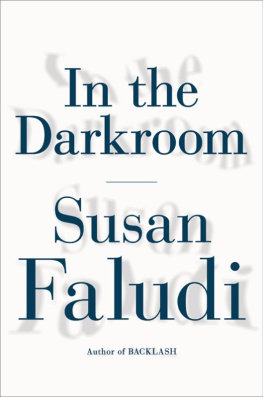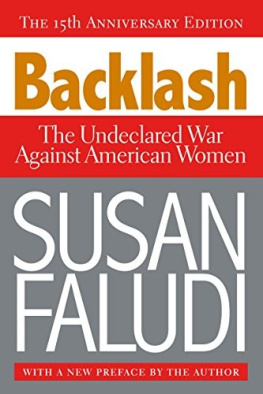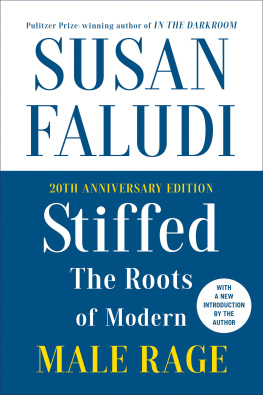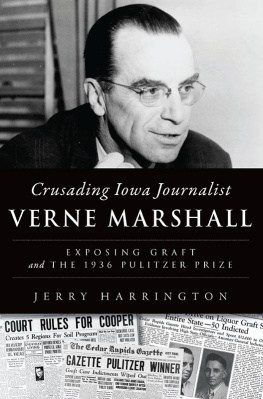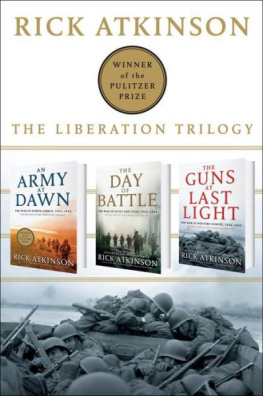IN THE
DARKROOM
SUSAN FALUDI
Metropolitan Books
Henry Holt and Company New York
The author and publisher have provided this e-book to you for your personal use only. You may not make this e-book publicly available in any way. Copyright infringement is against the law. If you believe the copy of this e-book you are reading infringes on the authors copyright, please notify the publisher at: http://us.macmillanusa.com/piracy.
For the Grnbergers of Spisk Podhradie and the Friedmans of Koice, and their children and their childrens children, the family I found, and who found me
He thought about how he had been despised and scorned, and he heard everybody saying now that he was the most beautiful of all the beautiful birds. And the lilacs bowed their branches toward him, right down into the water. The sun shone so warm and so bright. Then he ruffled his feathers, raised his slender neck, and rejoiced from the depths of his heart. I never dreamed of such happiness when I was an ugly duckling!
Hans Christian Andersen, The Ugly Duckling
The identifying of ourselves with the visual image of ourselves has become an instinct; the habit is already old. The picture of me, the me that is seen, is me.
D. H. Lawrence, Art and Morality
Long ago
there was a strange deception:
a wolf dressed in frills,
a kind of transvestite.
But I get ahead of my story.
Anne Sexton, Red Riding Hood
In the summer of 2004 I set out to investigate someone I scarcely knew, my father. The project began with a grievance, the grievance of a daughter whose parent had absconded from her life. I was in pursuit of a scofflaw, an artful dodger who had skipped out on so many thingsobligation, affection, culpability, contrition. I was preparing an indictment, amassing discovery for a trial. But somewhere along the line, the prosecutor became a witness.
What I was witness to would remain elusive. In the course of a lifetime, my father had pulled off so many reinventions, laid claim to so many identities. Im a Hungaaaarian, my father boasted, in the accent that survived all the shape shifts. I know how to faaaake things. If only it were that simple.
Write my story, my father asked me in 2004or rather, dared me. The intent of the invitation was murky. It could be like Hans Christian Andersen, my father said to me once, later, of our biographical undertaking. When Andersen wrote a fairy tale, everything he put in it was real, but he surrounded it with fantasy. Not my style. Nevertheless, I took up the dare with a vengeance, and with my own purposes in mind.
Despite the overture, my father remained a refractory subject. Most of the time our collaboration resembled a game of cat and mouse, a game the mouse generally won. My father, like that other Hungarian, Houdini, was a master of the breakout. For my part, I kept up the chase. I had cast myself as a posse of one, tracking my fathers many selves to their secret recesses. I was intent on writing a book about my father. It wasnt until the summer of 2015, after Id worked my way through many drafts and submitted the manuscript, and after my father had died, that I realized how much Id also been writing it for my father, who, in my mind at least, had become my primary, imagined, and intended readerwith all the generosity and hostility that implies. It wasnt an uncomplicated gift.
There are things in here that will be hard for you to take, I warned in the fall of 2014, when I called to announce that I had a completed draft. I braced myself for the response. My father, who had made a career in commercial photography out of altering images and devoted a lifetime to self-alteration, would hate, I assumed, being depicted warts and all.
Waaall, I heard after a silence. Im glad. You know more about my life than I do. For once my father seemed pleased to be captured, if only on the page.
One afternoon I was working in my study at home in Portland, Oregon, boxing up notes from a previous writing endeavor, a book about masculinity. On the wall in front of me hung a framed black-and-white photograph Id recently purchased, of an ex-GI named Malcolm Hartwell. The photo had been part of an exhibit on the theme What Is It to Be a Man? The subjects were invited to compose visual answers and write an accompanying statement. Hartwell, a burly man in construction boots and sweat pants, had stretched out in front of his Dodge Aspen in a cheesecake pose, a gloved hand on a bulky hip, his legs crossed, one ankle over the other. His handwritten caption, appended with charming misspellings intact, read, Men cant get in touch with there feminity. I took a break from the boxes to check my e-mail, and found a new message:
To: Susan C. Faludi
Date: 7/7/2004
Subject: Changes.
The e-mail was from my father.
Dear Susan, it began, Ive got some interesting news for you. I have decided that I have had enough of impersonating a macho aggressive man that I have never been inside.
The announcement wasnt entirely a surprise; I wasnt the only person my father had contacted with news of a rebirth. Another family member, who hadnt seen my father in years, had recently gotten a call filled with ramblings about a hospital stay, a visit to Thailand. The call was preceded by an out-of-the-blue e-mail with an attachment, a photograph of my father framed in the fork of a tree, wearing a pale blue short-sleeved shirt that looked more like a blouse. It had a discreet flounce at the neckline. The photo was captioned Stefnie. My fathers follow-up phone message was succinct: Stefnie is real now.
The e-mail notifying me was similarly terse. One thing hadnt changed: my photographer father still preferred the image to the written word. Attached to the message was a series of snapshots.
In the first, my father is standing in a hospital lobby in a sheer sleeveless blouse and red skirt, beside (as her annotation put it) the other post-op girls, two patients who were also making what she called The Change. A uniformed Thai nurse holds my fathers elbow. The caption read, I look tired after the surgery. The other shots were taken before the op. In one, my father is perched amid a copse of trees, modeling a henna wig with bangs and that same pale blue blouse with the ruffled neckline. The caption read, Stefnie in Vienna garden. It is the garden of the imperial villa of an Austro-Hungarian empress. My father was long a fan of Mitteleuropean royals, in particular Empress Elisabethor SisiEmperor Franz Josefs wife, who was known as the guardian angel of Hungary. In a third image, my father wears a platinum blond wigshoulder length with a 50s flipa white ruffled blouse, another red skirt with a pattern of white lilies, and white heeled sandals that display polished toenails. In the final shot, titled On hike in Austria, my father stands before her VW camper in mountaineering boots, denim skirt, and a pageboy wig, a polka-dotted scarf knotted at the neck. The pose: a hand on a jutted hip, panty-hosed legs crossed, one ankle over the other. I looked up at the photo on my wall. Men cant get in touch with there feminity.
The e-mail was signed, Love from your parent, Stefnie. It was the first communication Id received from my parent in years.
My father and I had barely spoken in a quarter century. As a child I had resented and, later, feared him, and when I was a teenager he had left the familyor rather been forced to leave, by my mother and by the police, after a season of escalating violence. Despite our long alienation, I thought I understood enough of my fathers character to have had some inkling of an inclination this profound. I had none.
As a child, when we had lived together in a Colonial tract house in the suburban town of Yorktown Heights, an hours drive north of Manhattan, Id always known my father to assert the male prerogative. He had seemed investedinsistently, inflexibly, and, in the last year of our family life, bloodilyin being the household despot. We ate what he wanted to eat, traveled where he wanted to go, wore what he wanted us to wear. Domestic decisions, large and small, had first to meet his approval. One evening, when my mother proposed taking a part-time job at the local newspaper, hed made his phallocratic views especially clear: hed swept the dinner dishes to the floor. No! he shouted, slamming his fists on the table. No job! For as far back as I could remember, he had presided as imperious patriarch, overbearing and autocratic, even as he remained a cipher, cryptic to everyone around him.
Next page
